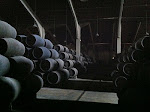Corked Wine - Can you Spot it?
Do you know what corked wine smells like? If you opened a corked bottle at home or were served one in a restaurant, would you be able to identify it as corked?
At this point I have to say that I cannot reliably identify corked wine unless there is an unaffected bottle open for comparison. I bet I'm not alone in this and I mean among you, people who drink a lot of wine. Think about it - when was the last time you opened a corked bottle of wine at home? I open wine almost every day and I never seem to hit a corked bottle. According to the accepted stats, that's impossible. I have to be drinking corked wine from time to time, I'm just not realizing it. Those bottles here and there that I don't like, some of them must be corked.
A moment of clarification - overheating cannot cause a wine to become corked. A dry cork that crumbles into the wine does not mean that the wine is corked. Corked wine is wine that contains the compound 2,4,6-trichloroanisole, or TCA, a compound that is introduced by a tainted cork. According to a pretty well accepted Wine Spectator study, about 7% of wines are corked. More white than red, but about 7% on the whole. If you have 100 bottles in your cellar, about 7 of them are corked. That can be both expensive and incredibly frustrating - check out Craig Camp's recent experience with a corked rare wine.
The descriptors commonly used to describe corked wine include moldy basement, wet dog, locker room towels, and things like that. I can promise you this - I'm not drinking wine that smells like a sweaty locker room towel. But I must be drinking corked wine from time to time, so what's going on here?
TCA can be present in low enough volume so that even a sensitive nose will not get wet dog. Maybe the sensitive nose would notice a lack of fruit, a dull, and muted wine. Or maybe TCA is present in high volume but the taster is not sensitive to it. There are people who can savor great details in aroma and flavor of wine, but who cannot detect TCA when it's present. This is complicated by the fact that TCA can take time to reveal itself in its ugly glory. A wine might seem dull when opened, and then will reek of TCA after 45 minutes. And furthermore, a person drinking corked wine can become sensitized to TCA over the course of the bottle, the way we become sensitized to most objectionable odors if we continue to smell them.
My "a-ha moment" with corked wine came at a retail tasting. The clerk opened a bottle of Lambrusco and poured me a taste. I was not impressed with the wine. Not terrible, just dull. The clerk put her nose in the glass and almost retched - "incredibly corked," she said. She opened another bottle and only in comparing them side by side did I understand that the first one was corked. So you'd figure that I would be better at picking out a corked bottle after that, right? That was about two years ago, and I still haven't had a corked bottle at home, if you asked me.
At Keith's BBQ the other night I had a similar experience. Keith poured a glass of something and knew immediately that it was corked. I poured myself a glass and again thought it was just dull. 10 minutes later some one else walked over and I poured him a glass and asked his opinion, asking if he thought it was okay. He almost gagged upon smelling. What are these people smelling that i am missing?!? I must be one of those people with very little sensitivity to TCA.
TCA can't hurt you, it's not poisonous or anything. The worst that will happen to me is that I'm going to drink a corked wine and think it's bad quality wine, when in reality an untainted version might be great. But I may not go back for seconds, and will walk away thinking that I don't like a certain wine. I may even write about it here, misleading you. Now that I understand my situation, I've become suspicious of basically every bottle I open. "Do you think this is corked" echoes off the walls in my house now. It would be great if wine service professionals in restaurants detected TCA for me, as I clearly cannot do it on my own yet. Jeremy Parzen just wrote something interesting about this. And apparently he's good at detecting cork taint.
I guess my point is, if you don't feel confident that you can detect cork taint in a wine, you're not alone. I can't do it, and I have the chutzpah to write a wine blog.







12 comments:
Oh, oh, there goes your chance to become a famous wine writer! ;) Then again, the most famous wine critic of all can't tell when a red wine is a red dessert wine...still.
First, what kind of wine you have in your glass determines how easy it is to detect TCA. Oak, in particular, masks TCA detection (masks = hides or confuses your sense of smell). You find more TCA in German whites, than Cal. reds, because German whites aren't oaked (and much less manipulated, etc.), making them purer, and easier for your nose to find the TCA.
One hint is that the longer the bottle is open the more obvious the TCA smell becomes. A stinky wine that isn't TCA contaminated, will blow off some of the stink. (Which, could be brett, for example.) I also think of TCA as herbaceous compared with brett which is more stinky barn/dog.
I'm quite sensitive to TCA, and my wife even more so...she spots them instantly.
By the way, with old wines, it's quite clear; the wine is either very strongly TCA-ish or it isn't - there is no middle, confusing ground.
It's also true that everyone has a different tolerance threshold for TCA. Given your descriptions of events, I'd say yours is likely low.
A rep once brought us a bottle of wine that had been open all day and he'd been tasting it with numerous accounts. When he poured it for us, we all remarked that it was corked. He smelled it again, and sure enough, it was. He has a very good palate and knows it wasn't corked in the morning, but possibly became so when he put the cork back in opposite of how it was originally placed. The top of the cork tainted the bottle. This is the only time I - then and now - have ever witnessed this, but it was interesting.
My suggestion for identifying corkage is drink the wine. If you come upon a corked bottle, get to know it. Especially if it's a corked badly, you'll never forget.
Sad to say, perception of TCA varies wildly among wine-lovers. I am "blessed" with being incredibly, annoyingly sensitive (my wife even moreso) to TCA, yet my perception of Brett is minimal. At wine dinners, I am the "go-to" person whenever someone's wondering if something's corked. What a privilige...
Anyway, everyone detects it differently, and it sounds like you have a low threshold. If you think a wine is dull or not right, open a similar bottle and see if it's not brighter and better.
And be happy you can't smell that crap.
Cheers!
I'm in your camp, Brooklynguy. Even when a wine is very corked I am at first no more than suspicious that something is wrong, and need to wait ten minutes before I reach the screamingly obvious conclusion that, yes, I am smelling wet newspaper. And then I wonder how much wine I've had that was only mildly corked and not understood by me as such. I wish I could be more spot on about this!
I think the most important thing is the first sniff. It is easy to convince your self that a wine is not corked - by repeatedly sniffing - which just results in your nose becoming desensitized. If in doubt - leave it for a few minutes and return, or as you have done - ask someone else.
At least half of what I open is sealed in screwcap, so cork taint is less of a problem (there have been reports of TCA tainted screwcap bottles, though I am yet to come across one). Even so, I still come across a tainted bottle at least month. As some of the comments point out, there is a huge variation in detection threshold, but also some wines have such a low level of taint, they just seem dull rather than foul.
jack - from what you're saying, i should be having an easier time detecting a corked bottle, as the majority of the wine i drink is not oaked, and not manipulated.
i think i just have a high threshold for TCA.
thanks all for your comments, and michel - i think i will have to start doing that more often - opening a second bottle if i suspect something is off. that way i will learn from being right or wrong...
i honestly believe that there are many people who love wine and know a lot about it (wicker parker said as much in his comment) who are not yet expert at detecting cork taint. let's make sure we're not ashamed to ask each other. this kind of thing has been enshrouded in snobbery, and it shouldn't be.
Knock wood, way less than 7% of the bottles I open at home are corked. I associate TCA with a certain smell. I never thought about it as something that would simply "dull" a wine. Dull wines I've opened!
I'm not sharp on detecting corked wine either. I suspect sometimes that wine tasters are over-sensitive to cork taint, but that feeling may come from my onwn inability to spot someof the TCA occurences...
I'm in the same boat: I don't always detect TCA right off the bat. There have been a few times when I was unimpressed with a wine and thought it just wasn't my style, only later to hear someone point out that it was corked.
I guess we can't all James Laube's nose. I've read where he feels the percentage is something along the lines of 10% of all bottles or higher. I personally think he is especially sensitive, and he's in a position of influence in the wine community. Perhaps his pressure on bottle closures in the industry the, dare I say, Laube-ization of wine?
Terrific piece. The heart betrays the nose - you open a very special bottle, you are so excited to be serving it, the perfect pairing for the meal, then you sniff and say "No, this can't be true, maybe it just needs to blow off..." -done that a number of times. I don't find them 7% of the time, but close. Maybe you need greater "throughput" for the your statistics to approach the normal...
thanks for your comments bert, steve, joe, and doug - good to hear that i'm not the only one, even among wine lovers and bloggers.
joe - my sample size is pretty high at this point, call it 330 per year at home. that should be enough so that i find between 3-10 % corked wines. but i don't recognize them.
Post a Comment